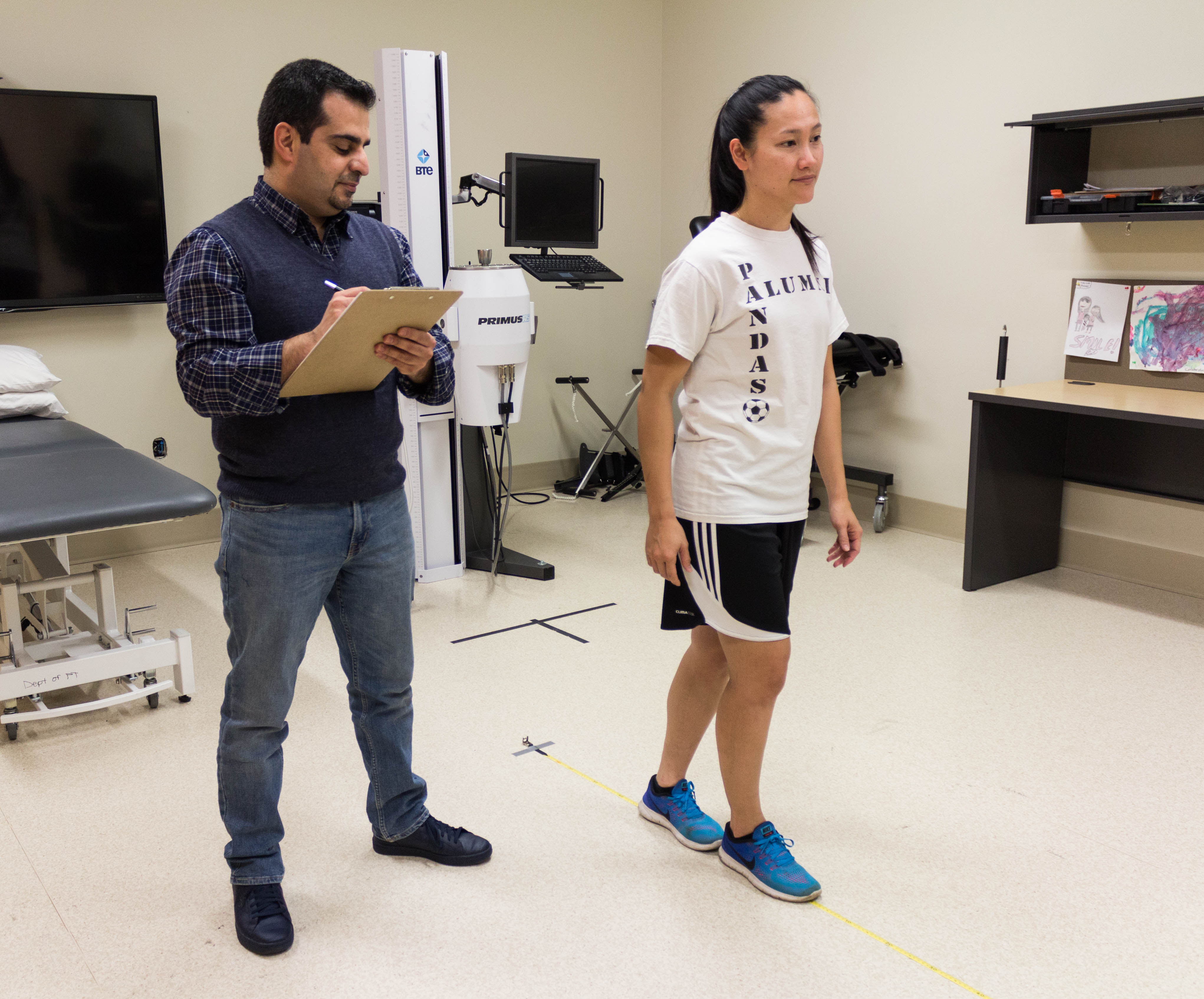
Thaer Manaseer, PhD student in the Faculty of Rehabilitation Medicine (left) hopes that his study can add more insight into possible assessment methods to streamline diagnosis and recovery.
Every year, over three million people in North America will experience a concussion. That's three million people who may suffer from headaches, dizziness, lack of sleep, foggy thinking or emotional distress for up to ten days following their concussion.
What many people don't know is that approximately 15 to 30 per cent of these individuals will continue to exhibit some of these symptoms well beyond that time frame. In fact, for some, concussion symptoms can linger for months.
In addition to these symptoms, people who suffer a concussion may also demonstrate changes in how they balance and walk, even after all of their symptoms have resolved and they have returned to activity.
After conducting an in-depth review of past balance and concussion-related studies, a new University of Alberta study is hoping to bring awareness to the need for more comprehensive testing when it comes to individuals with ongoing issues.
But first, more participants are needed.
"We are currently looking for a total of 68 participants between the ages of 13-18: 34 athletes with a history of sport-related concussion and 34 healthy athletes that have never had a concussion," says Thaer Manaseer, PhD student in the Faculty of Rehabilitation Medicine, who is conducting the research.
Using a new comprehensive battery of tests, the study will assess participants' balance issues in relation to their concussion history. The data compiled will provide researchers with a foundation for a detailed functional balance-testing protocol to assist with return to activity recommendations following a concussion.
"Individuals who have experienced a concussion may be at risk for other injuries when they return to activity, which could be a result of ongoing balance issues," says Manaseer. "Walking is a complex task that requires proper coordination between multiple body systems and segments. So if someone has a concussion, the neurological mechanisms that control a person's gait-the pattern of the individual's walk-may be temporarily disrupted. This results in the individual walking slower or with a greater left-to-right sway."
Manaseer and his PhD supervisors, Doug Gross, professor and Jackie Whittaker, assistant professor, Department of Physical Therapy, Faculty of Rehabilitation Medicine hope to recruit the full number of participants by the end of 2018 to start on the collection of data. This information will ultimately contribute to an improvement in the long-term welfare of concussed individuals.
"By being able to more accurately assess balance, it is hoped that the number of injuries can be reduced," says Manaseer.
Currently, the most common method for assessing gait following a concussion is the tandem gait test-a test that challenges a concussed individual's ability to walk heel-to-toe along a three-metre line.
But Manaseer believes this method does not provide sufficient balance testing for patients.
"It is important that we develop new methods for evaluating gait and balance following a concussion that uses more complex tasks. Especially for those returning to physical occupations and sports activity."
The limited balance testing options were brought to light during a 2017 critical review conducted by Manaseer and his two PhD supervisors.
The review looked at studies that reported on the incidence of ongoing balance issues in relation to present and past concussions. From this, gait association was confirmed, as was the need for more in-depth testing options.
"Based on our review, we underscored the need for developing new clinical assessment methods that can better detect gait disturbances in individuals with concussions," says Manaseer. "Gait is not the concrete method for diagnosing a concussion, but it is one of the major components that go in to completing an assessment."
Manaseer hopes that his study can add more insight into possible assessment methods to streamline diagnosis and recovery.
"The decision to return to activity following a concussion is a multimodal process that involves many factors. While gait is just a small part of that, we really think it can be effective in assessing neurological health."
For more information about becoming a participant, email elmanase@ualberta.ca.